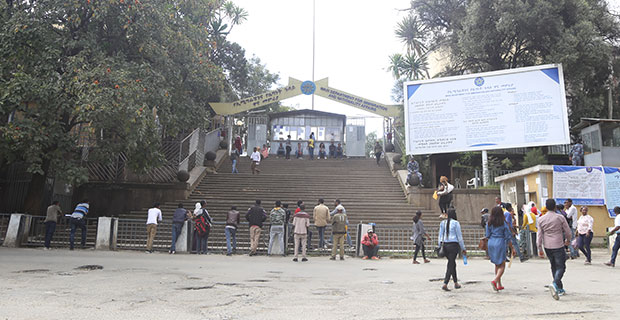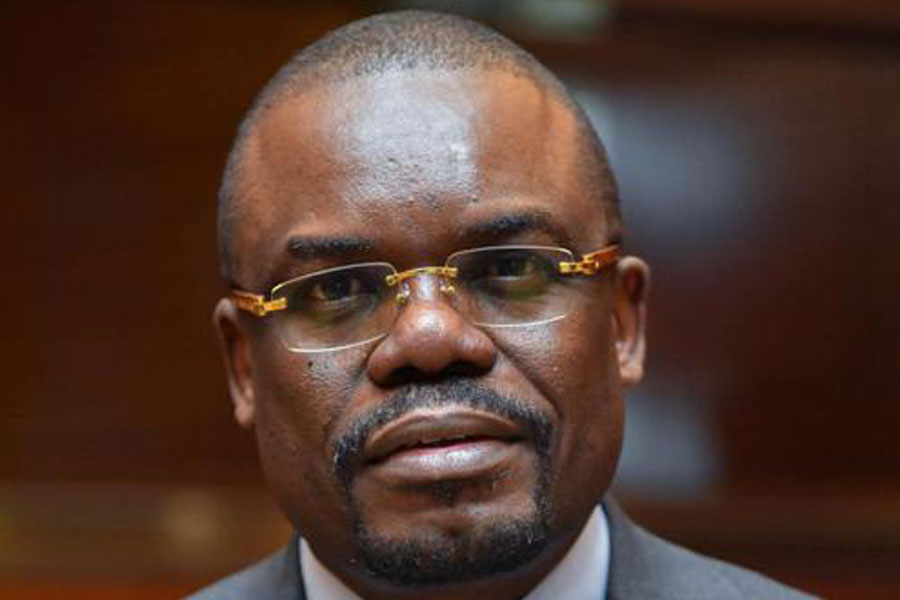
Radar | Nov 30,2019
Sep 19 , 2020.
As economic policies are refocused from state-led, demand-side economics to market-oriented, supply-side economics, his position is indeed the most consequential to the economic near future of Ethiopia.
Few have had their work cut out for them as Yinager Dessie (PhD), governor of the National Bank of Ethiopia (NBE). As economic policies are refocused from state-led, demand-side economics to market-oriented, supply-side economics, his position is indeed the most consequential to the economic near future of Ethiopia.
Neither has he been shy, if not free of the historically politically infused nature of his position. The past two years have passed in a whirl. A new administration that vowed not to finance economic development - but acts as rule maker and umpire - came to power. Soon enough, a global pandemic created havoc on economies around the world as well as domestically.
Just as demanding of Yinager’s attention was a liquidity crunch back in January, when the threshold for liquid assets fell below the 15pc floor at some banks. The ratio for deposits to loans and advances surpassed 100pc, revealing that the banks were on a tight rope. The problem was deeply worrying to the point that the Ethiopian Bankers Association recommended limiting cash withdrawals.
That was what the central bank did. With only some exceptions, the cash individuals and businesses can withdraw daily was limited to 200,000 Br and 300,000 Br, respectively. It has also put out a directive against holding over 1.5 million Br in cash outside of banks.
The central bank under Yinager, an executive with environmental economics as a field of study and made a debut with the foreign service, did not stop there. It had been mulling demonetisation for some time, even before the Association recommended reissuing banknotes and introducing higher denomination bills.
The news of demonetisation broke early last week. The new notes will replace those in circulation within the coming three months. The five Birr note will be converted into a coin, meeting the same fate as the one Birr note a decade ago.
The highest denomination note since the country began to print money - 200 Br - has also been introduced. The purpose of this bill, as well as the creation of the five Birr coin, has been to meet the increasing demand for cash as a result of the lower value of the Birr, according to the Governor. These changes will reduce wear and tear, save the foreign currency spent on printing costs, and make transactions smoother. These are points hard to argue against.
The government’s view that it will improve financialisation is also not far-fetched. By compelling people that deposit over 10,000 Br to open bank accounts and making compulsory purchases of any asset through banks, it is a step forward in invigorating the formal sector.
Harder to justify is the claim that reissuing notes will help the fight against corruption, contraband and counterfeiting. Indeed, over 109 billion Br was outside of banks by the third quarter of the last fiscal year, a ninth of the broad money supply at the time.
For a cash-based economy such as Ethiopia's, it is not an overwhelming amount of money. It also does not necessarily mean that it is illegally held - just that households, individuals and businesses are holding it instead of keeping it with the banks. Compared to the same period the previous year, there was a 12pc increase, a rather average growth rate for the country.
The broad money supply over the same period also jumped by over 18pc, while total domestic credit rose by 23.5pc. In as far as the central bank’s report is concerned, nothing out of the ordinary has been occurring, at least by late March this year, or even by May when the Bankers Association said that currency outside of banks had reached 113 billion Br.
Still, Ethiopia has a large economy in the shadows, outside the purview of the state. Most saving and borrowing continues to take place outside of the banks, which undoubtedly needs addressing. But carrying out demonetisation, as institutive as it sounds, is not guaranteed to work.
The most recent example of this is India. In 2016, the government surprised its citizens with the announcement that the two highest notes - 500 rupee and 1,000 rupee bills - would be demonetised. It had hoped to deal a blow to counterfeiting and the black economy by removing at least a fourth of the demonetised notes from circulation - since many earning cash through illegal activities would not want to be identified.
The government’s endeavour is now largely considered to be a failure that was not redeemed by the disruptions it caused throughout the economy. Over 99pc of the demonetised banknotes were deposited into banks, meaning that black money did not have a problem slipping through the cracks to be exchanged for the newly issued notes.
Partly, this was because only about five percent of illegally acquired money was believed to have been held in cash. Partly, it could be because “most people who had black money found other people, who did not have black money, to deposit their savings into the banking system for them,” as Vivek Kaul, Indian commentator and author, wrote for the BBC.
The objective of addressing counterfeiting had an even more abysmal record. Counterfeit money increased in some instances over the next few years despite the new notes boasting enhanced security features.
Both of these instances should trouble Ethiopia's central bank. There is just as much reason to suspect that money earned through illegal activities is not kept under mattresses in most cases but exchanged for foreign currency or assets. Neither would it be too surprising that people may find a way of evading banks to get the new notes. The same goes for counterfeiting. It may worsen for the simple fact that a more valuable bill - which gives higher returns if counterfeited and successfully passed - now exists.
This is the cold reality of structural imbalances. There will always be demand for black money in an economy that still has a stubborn informal sector. This has more to do with the formal sector not being able to effectively meet the demand for goods and services, as well as credit and opportunities, and less to do with security features of banknotes.
The re-issuance of banknotes would thus be only a temporary annoyance to the dynamism of black money as significant structural shortcomings remain unaddressed. It is an indication that the headaches arising out of a cash-based economy are inherent, and worsened further by the large chunk of transactions which continue to take place outside of the banking system.
Complicating this factor even more is the shaky ground of trust that economic planning stands on as a result of the continued politicisation of economic institutions. Despite promises to the contrary, the central bank continues to be perceived as an institution that considers political agendas in its decision-making, not as much burdened by macroeconomic factors such as inflation and unemployment.
What this leads to is speculation. In this case, it could be the expectation that the value of the Birr will fall as a result of the introduction of the 200 Br notes. It means more spending to ditch the Birr and buy assets, worsening already high inflationary rates.
The bulwark against such possibilities is economic institutions that appear to be above politics and are consistent in their stated principles. Execution of such massive changes is going to be complicated even when the policy has been proven to work. It is likely to be even more complicated with a move that is known to have questionable consequences.
Speculation does not need to be added to such a headache, but it will inevitably be felt soon enough.
PUBLISHED ON
Sep 19,2020 [ VOL
21 , NO
1064]

Radar | Nov 30,2019

Radar | Apr 17,2021

News Analysis | Oct 20,2024

Fortune News | Aug 17,2019

Radar | Feb 25,2023

Fortune News | Mar 12,2020

Fortune News | Aug 18,2024

View From Arada | Sep 19,2020

Covid-19 | Jul 18,2021

Fortune News | Mar 16,2019

My Opinion | 131497 Views | Aug 14,2021

My Opinion | 127853 Views | Aug 21,2021

My Opinion | 125831 Views | Sep 10,2021

My Opinion | 123461 Views | Aug 07,2021

Dec 22 , 2024 . By TIZITA SHEWAFERAW
Charged with transforming colossal state-owned enterprises into modern and competitiv...

Aug 18 , 2024 . By AKSAH ITALO
Although predictable Yonas Zerihun's job in the ride-hailing service is not immune to...

Jul 28 , 2024 . By TIZITA SHEWAFERAW
Unhabitual, perhaps too many, Samuel Gebreyohannes, 38, used to occasionally enjoy a couple of beers at breakfast. However, he recently swit...

Jul 13 , 2024 . By AKSAH ITALO
Investors who rely on tractors, trucks, and field vehicles for commuting, transporting commodities, and f...

Jun 29 , 2025
Addis Abeba's first rains have coincided with a sweeping rise in private school tuition, prompting the city's education...

Jun 29 , 2025 . By BEZAWIT HULUAGER
Central Bank Governor Mamo Mihretu claimed a bold reconfiguration of monetary policy...

Jun 29 , 2025 . By BEZAWIT HULUAGER
The federal government is betting on a sweeping overhaul of the driver licensing regi...

Jun 29 , 2025 . By NAHOM AYELE
Gadaa Bank has listed 1.2 million shares on the Ethiopian Securities Exchange (ESX),...